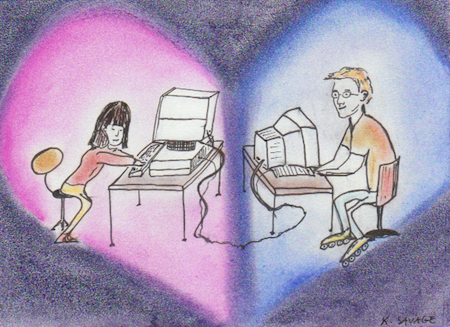2011 Plus or Minus a Decade

[UPDATE 2022-01-04: Verdicts added! I'm giving myself a 3 out of 7. PS: Here’s an internet archive link to keep me honest.]
End-of-year retrospectives are so over done! Let’s talk about how life has changed since 2000. And then to really make it exciting, I’ll give my predictions for what life will be like in 2021.
How our lives have changed since 2000
We’ll start with an obvious one.
1. Flying became a bigger pain in the ass
I.e., the terrorists won. To quote Bruce Schneier:
A terrorist attack cannot possibly destroy our country’s way of life; it’s only our reaction to that attack that can do that kind of damage.
The next 6 are about computers, unsurprisingly.
2. Computers became less computer-y and more appliance-y
This is exemplified by my grandmother’s iPad. She and I have had at least two simultaneous games of online Scrabble going 24/7 for months now. [UPDATE 2022: We continued playing back-to-back Scrabble games all decade long until my grandma’s death in 2021.]
Or the Chromebook I got for my parents, which is impressively simple. Ironically it’s Linux (meganerd OS/kernel) underneath but the beauty is that you’re 100% shielded from what’s underneath. (You literally have to flip some secret switch under some panel on the back to be able to get to the real operating system. Tip: never do that.) What you see is the web, and that’s it. Really anything any normal person ever needs is available on the web. So there are no files for you to back up, or anti-virus software, or in fact any software at all. And the laptop can vanish in a puff of smoke at any moment and you’ll never lose a keystroke of work.
3. A computer in every pocket!
Since 2000 it has become normal to carry around a computer in your pocket that beats the pants off what people had on their desks not long ago. Even the screen resolution on some so-called smartphones beats what was common for desktop computers in the 90s.
I was particularly struck by how an iPod Touch fits unambiguously in my wallet. It’s thinner than a stack of 6 credit cards, roughly as wide, and only a bit taller. To drive home what a magical technological future we’re living in, here’s a list of old-fashioned devices that this single wallet-sized thing can (or could easily) subsume:
fax machine, address book / rolodex, calculator, calendar, cash / credit cards, stamps, keys, checkbook, flashlight, pager, tv, radio, caller id device, typewriter, gameboy, paper/pen, boardgames, barcode scanner, clock / alarm clock / timer, stereo/walkman/discman, remote control, globe/atlas, gps device, encyclopedia, books, electronic translator, etch-a-sketch?, photo album, tape recorder / memo recorder, vcr, camera / video camera, telephone, computer, walkie-talkie, credit card reader, …
It’s funny that we think of these universal Turing machines in our pockets foremost as telephones. Paul Graham predicts that we’ll end up calling them tablets, some of which happen to be small enough to hold up to your ear.
4. Internet dating goes mainstream
Let’s get Bethany Soule’s thoughts on this one:
I remember that in 1999/2000-ish a friend of mine met a girl on the internet and ended up dating her for a couple years and that was totally crazy — “You don’t know anything about her! She could be an axe murderer!”. In 2004 when Danny and I met on the internet it was a little weird, and we sort of glossed over the internet part of it when we related the tale to ‘normal’ people at the time. Now in 2011, Match.com advertises on TV and I don’t hesitate in the least to say that I met D via the internet, because it’s utterly commonplace, regardless of the audience.
More generally, everything you do that involves information moving between people (in addition to dating there’s banking, job searching, commerce, and advertising, to name a few) is intermediated by the internet. Texting isn’t technically part of the internet but it’s a related big change in how we communicate since 2000.
5. Just-in-time social coordination
Speaking of texting, here’s Nate Binkert on a related change:
It may seem trivial, but something that changed significantly for me in the last 10 years is how I meet people when going out or when generally out and about. Way back when, you had to be more specific about when and much more specific about where you were going to meet someone. Also, if someone was late or there was miscommunication, it was much harder to resolve what to do. (Go to the next party, go home, let your friend know that you were late.) Now it’s all just-in-time. You call someone and say “where are you?” and start describing objects around you so you can locate each other. Also, it is far easier for people to split up and rejoin easily when mobile. I think this has probably resulted in a lot more people being habitually late, but at least you can play Angry Birds on your smartphone now.
6. Newspapers and magazines were killed by the internet
Or maybe Kindles and iPads struck the death-blow. And, yes, printed news media technically still exist in 2011 but you have to admit they’re starting to seem archaic.
7. Instant information about anything from anywhere
Wikipedia was launched in 2001 (I googled “wikipedia wikipedia” to find Wikipedia’s article on Wikipedia) and has an arguably daily impact on our lives. Also Google was just a baby in 2000. It was clear then that this was the direction things were heading, but now the dream is really for real: Pretty much anything you want to know about anything is available instantly from anywhere. Also, WolframAlpha deserves special mention for contributing to this (cf. the last item in this list).
8. No more smoking in bars and restaurants
California started this worldwide trend in 1998. This used to be my hotbutton issue but I did an ironic 180 around 2006, when I moved to New York City. For one thing, I realized that the smoke-free workplace laws were not exactly the cause of less smoking in restaurants but mostly the effect. The social norms shifted and the laws followed. But the irony was my reaction to the smoke-free workplace law in NYC, something I looked forward to longingly when moving from not-yet-smoke-free Michigan. Quoting myself from January 2007:
Living in supposedly smoke-free New York City you can’t walk a block without getting three facefuls of smoke. I keep thinking how nice it would be to get the smokers into some kind of special smoking establishments — “bars” if you will — and off the damn sidewalks!
9. Less death and suffering!
The treatments for various diseases (AIDS, most notably) took some quantum leaps forward. One such advance, a crazy mouse-human hybrid drug first approved in 1998, saved my colon from having to get ripped out. So that’s quite a change in everyday life for some of us.
10. Less crime and violence
Check out what’s been happening with crime in the US since 2000: http://www.wolframalpha.com/input/?i=crime+2000. I certainly felt this change living in New York City, where the drop in crime in the 2000s was especially steep. And although it’s not limited to the past decade, it’s worth echoing Stephen Pinker’s conclusion that we’re in the midst of a long-term, global decrease in overall violence.
Predictions about life in 2021
1. Self-driving cars!
Note that the focus here is on noticeable changes in our everyday lives. So this one hasn’t already come true in 2011 just because a handful of us have had a little tour of Mountain View for a demo drive (freakin’ awesome as that was). It will have to be at least slightly mainstream, at least among Messy Matters readers.
(Like how smartphones are mainstream now but in 2000, handheld devices that could wirelessly connect to the internet were so bleeding edge that they didn’t count as affecting our daily lives. Palm Pilots were all the rage but they were mostly just electronic rolodexes/calendars.)
To pin this down: I predict that I, personally, in 2021 will have a car that can drive entirely by itself at least on freeways.
[2022 VERDICT: False. But soooo close! I probably could’ve counted this as true if I’d moved to Phoenix where Waymo has fully autonomous taxis, open to the public, with no one in the driver’s seat. We’re definitely getting there!]
2. Vanishing computers!
I’m thinking wearable and embedded in things instead of carrying around little gadgets.
[2022 VERDICT: False. Sadface. It looked like we were taking baby steps in this direction with Google Glasses in 2013 but, then, bupkes.]
3. Death of physical media!
CDs and DVDs and USB thumb drives will all be long gone. Paper books won’t be but they’ll seem kind of quaint.
[2022 VERDICT: True. This one seems like it already would’ve been obvious in 2011 but then again, so did plenty of things that didn’t happen.]
4. Artificial eidetic memory!
No such thing as ever forgetting someone’s name or anything you’ve ever seen or heard.
[2022 VERDICT: False. This seems so possible with current technology!]
5. Scary political nastiness!
I’m thinking something akin to McCarthyism, but for a new category of bogeyman. (And, again, to the point of affecting our everyday lives.)
[2022 VERDICT: Let’s call it false for being such a stupidly vague prediction. What was I thinking there? Is Trumpism or cancel culture akin to McCarthyism? I have no idea and even if you think so, I didn’t actually predict it so I don’t deserve any Bayes points here.]
6. Less death and suffering, continued
At least one reader will be able to testify to a life-changing advance in medicine.
[2022 VERDICT: True. This one’s ironic in light of the pandemic but mRNA vaccines absolutely count here. Or my sister beating cancer.]
And, finally:
Negative prediction: Siri is a fad!
That’s overstating it, of course. It will get better and become more common and more useful, but that’s it. I predict no progress on having a reasonable natural language conversation with a computer. Today’s Siri commercials will oversell even the voice interfaces of 2021. (I was similarly a bit down on IBM’s Watson earlier in 2011.)
[2022 VERDICT: True. This one is debatable, I suppose, but here’s my argument. The progress on voice interfaces since the introduction of Siri has been extremely incremental, just as I predicted. I admit Alexa is super useful, but only for a handful of specific tasks (playing songs, setting kitchen timers, answering arithmetic problems or googling things relevant to out-loud conversation happening among humans). There’s never any useful back-and-forth and if you watch one of the early ads and then try asking similar things, much of the time it falls on its face, even now.]
Illustration: Kelly Savage
Thanks to Gabe Hayos, Bethany Soule, Eileen Connor, David Reiley, Nate Binkert, Rob Felty, Brian Renaud, and Sharad Goel for contributions, ideas, and corrections.
